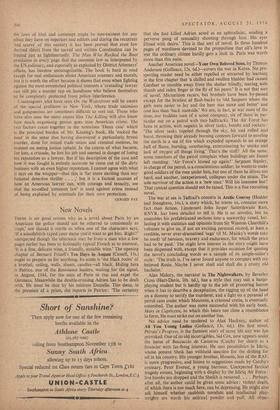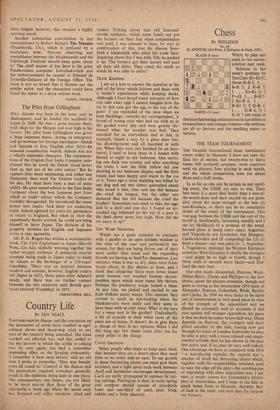MERE is no good reason why in a novel about
Paris by an American the police should not be referred to consistently as 'cops,' nor should it startle us when one of the characters says, 'If a sonofabitch raped your dame you'd want to get him. Right?' unexpected though the utterance may be from a man who a few pages earlier has been so fictionally typical French as to murmur, 'It is a fine, delicate wine, a friendly, amiable wine.' The opening chapter of Bernard Frizell's Ten Days in August (Cassell, 15s.) ought to prepare us for anything. Its scene is 'the black room' of a brothel; ceiling, walls, sheets, candles—all black. Hiding here is Patrice, one of the Resistance leaders, waiting for the signal, in August, 1944, for the men of Paris to rise and expel the Germans. Meanwhile the double-crossing Adrien has to be dealt with. He must be shot by his mistress Danielle. This done, in the presence of a priest, she reports to Patrice : 'The certainty that she had killed Adrien acted as an aphrodisiac, sending a perverse pang of sensuality shooting through him. His eyes filmed with desire.' This is that sort of novel. In three hundred pages of wordiness devoted to the proposition that all's love in war the ordinary citizen hardly gets a look in. Paris was worth more than this mess.
Another American novel—Your Own Beloved Sons, by Thomas Anderson (Gollancz, 12s. 6d.)—covers the war in Korea. No pro- specting reader need be either repelled or attracted by learning in the first chapter that 'a chilled and swollen bladder had caused Gardner to stumble away from the shelter blindly, tearing ,with thumb and index finger at the fly of his pants.' It is not that sort of novel. Micturition recurs, but brothels have been by-passed except for the briefest of flash-backs to 'old Sauporo where the girls were easier to lay and the beer was more and better' and cost less than 'back stateside.' We are, in fact, at war most of the time, our buddies men of a scout company, six of them in par- ticular out on a patrol with two halftracks. The Air Force has been in action, with napalm in silver tanks, bombs and rockets: 'The silver tanks toppled through the sky, hit and rolled and burst, throwing their already burning contents forward to envelop the earth in a sea of fire which exploded upwards in an orange ball of flame, burning, smothering, exterminating by smoke and lack of oxygen all things living.' That's the stuff! All the same, some members of the patrol complain when buildings are found left standing: 'Air Force's loused up again!' Sergeant Stanley. in charge of the patrol, is a conscientious soldier; he wants to make good soldiers of the men under him, but one of them he drives too hard, and another, inexperienced, collapses under the strain. The sole survivor of the action is a 'new man.' Will his keenness last? That cynical question should not be raised. This is a fine recruiting novel.
The war at sea is Taffrail's concern in Arctic Convoy (Hodder and Stoughton, 16s.), a story which, he warns us, contains more fact than fiction. Lieutenant John Jasper Satterthwaite Rust, RNVR, has been detailed to tell it. He is no novelist, but he assembles his prefabricated sections into a seaworthy vessel, bal- lasting it with statistics and opinions from Sir Winston Churchill's volumes to give us, if not an exciting personal record, at least a credible, never over-dramatised 'saga' (if M. Maisky's words may be used) 'of heroism, bravery and endurance, for which the price had to be paid.' The slight love interest in the story might have been dispensed with, except that it provides occasion for quoting the novel's concluding words as a sample of its simple-sailor's style : The truth is, I've never found anyone to compare with my beloved Rosie. Maybe I never shall and shall die a crusty old bachelor.'
Alan Malory, the narrator in The Nightwalkers, by Beverley Cross (Hart-Davis, 10s. 6d.), has a style that may suit a banjo.
playing student but is hardly up to the job of procuring horror when it has to describe a decapitation, the rigging up of the head on a dummy to terrify the murderer, and a fight on a pyramid of petrol cans under which Moumou, a criminal cretin, is eventually entombed. The author was more successful with his early book, Mars in Capricorn, to which this bears too close a resemblance in form. He must strike out on another line.
(ions lodged, however, this remains a highly amusing novel.
Another substantial contribution to our entertainment is Robert Kemp's The Maestro (Duckworth, 15s.), which is prefaced by a cautionary note: `Anyone observing any resemblance between the fstaidencastle and the Edinburgh Festivals should keep quiet about it.' The chief source of fun here is the great Panslavonian composer Gortchakovitch and the embarrassment he caused to Edward de Trouville-Delaney of the Foreign Office. The farce is not so broad that it flattens out the subtler satire, and the characters could have faced the music in a more serious work.
DANIEL GEORGE



































 Previous page
Previous page